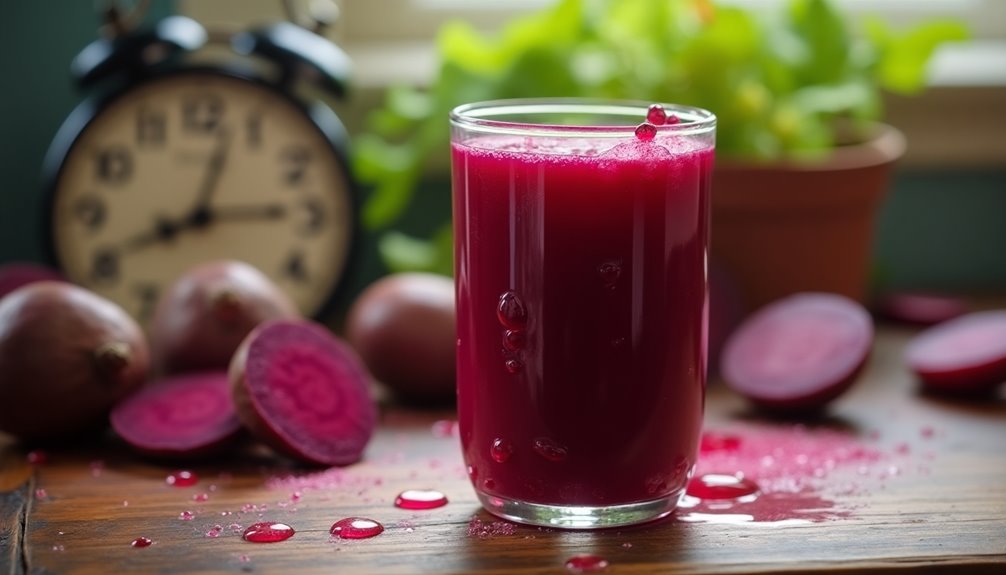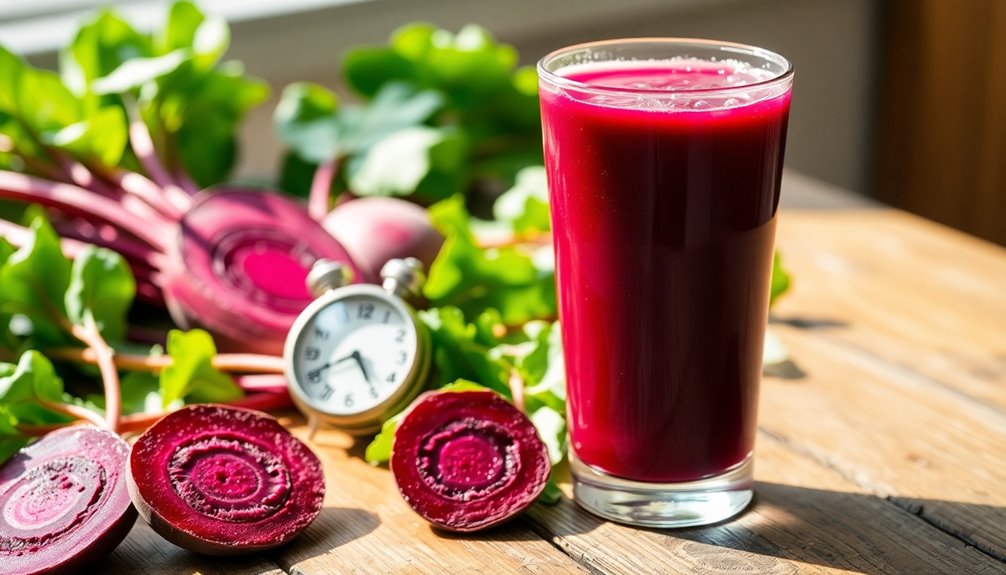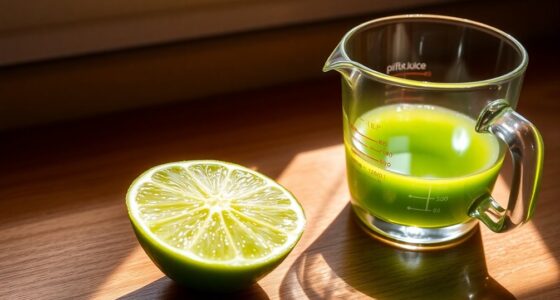Fresh beet juice lasts about 24 to 48 hours when you store it properly in the refrigerator. It's best enjoyed immediately after juicing to maximize flavor and nutrients. Make sure to keep the juice in an airtight container to prevent oxidation. If you notice any sour smells, darkening color, or mold, it's time to discard it. Want to learn more about preserving beet juice and avoiding spoilage? Keep exploring the options!
Key Takeaways
- Fresh beet juice is best consumed immediately after juicing to maximize nutrient retention and flavor.
- When refrigerated in an airtight container, fresh beet juice lasts about 24 to 48 hours.
- Signs of spoilage include a sour smell, darkening color, and presence of mold.
- For extended storage, freeze fresh beet juice in airtight containers for up to six months.
- Always check for unpleasant digestive issues before consuming stored beet juice to ensure safety.

Have you ever wondered how long fresh beet juice actually lasts? If you've taken the plunge and made your own beet juice, or if you've bought some from the store, it's a good idea to know its shelf life to make the most of its health benefits.
Fresh beet juice is best consumed immediately after juicing for maximum nutrient retention. However, if you find yourself with leftovers, you can store it in an airtight container in the refrigerator for about 24 to 48 hours.
When it comes to store-bought beet juice, things differ slightly. Once you've opened a bottle, it typically lasts about 2 to 5 days in the fridge. Keeping it sealed in an airtight container helps maintain its freshness.
On the other hand, if you've got an unopened bottle of store-bought beet juice, you can rest easy knowing it can last up to two weeks in the refrigerator before it reaches its expiration date. This can be especially convenient if you like to stock up on juices for convenience.
If you're looking for a way to extend the shelf life of your fresh beet juice even further, consider freezing it. Freezing beet juice can extend its shelf life to about six months, provided you store it in airtight containers. This method helps preserve the nutrients and flavor while allowing you to enjoy your juice later without worrying about spoilage.
Just remember to leave some space at the top of the container, as liquids expand when frozen.
Now, it's essential to be aware of the signs of spoilage, whether it's fresh or store-bought beet juice. If your juice develops a sour smell, starts to darken in color, or you notice any mold, it's time to toss it out.
Consuming spoiled juice can lead to unpleasant digestive issues, so it's better to be safe than sorry.
Frequently Asked Questions
How Long Can I Store Homemade Beet Juice?
You can store homemade beet juice in the refrigerator for about 24-48 hours.
To keep it fresh, make sure you use an airtight container to reduce oxidation.
If you need to save it for longer, freezing is a great option; it can last up to six months in proper freezer-safe containers.
Just remember to check for signs of spoilage like a sour smell or dark color before consuming any stored juice.
Does Fresh Beet Juice Go Bad?
Yes, fresh beet juice can go bad.
If you notice a sour smell or taste, darker color, or any mold, it's time to toss it.
Ideally, you should drink it right away for the best nutrients, but if you store it properly in an airtight container, it can last 24-48 hours in the fridge.
Always trust your senses—if it looks or smells off, don't risk it!
How Long Can You Keep Fresh Beetroot Juice in the Fridge?
You can keep fresh beetroot juice in the fridge for about 24 to 48 hours if you store it in an airtight container.
After that, its nutrient content starts to decline, and it may spoil.
If you notice any changes in smell or color, it's best to discard it.
For longer storage, consider freezing the juice, which can extend its shelf life up to six months while preserving its benefits.
How Long Does Fresh Juice Last After Juicing?
Fresh juice generally lasts about 24-48 hours after juicing when you store it properly in an airtight container.
If you want to extend its freshness, consider freezing it, which can keep the juice good for up to six months.
Just remember to look for signs of spoilage, like a sour smell or unusual color, before drinking.
Enjoy your juice while it's fresh to make the most of its nutrients!
Conclusion
In conclusion, fresh beet juice can last up to 3 days in the fridge when stored properly. That's quite short, but did you know that beets are packed with nutrients and can lower blood pressure by as much as 10 mm Hg in just a few hours? So, while you've got a limited window to enjoy your juice, its health benefits make it worth consuming quickly. Cheers to your health and vibrant energy!
Cindy thoroughly researches juicing trends, techniques, and recipes to provide readers with practical advice and inspiration. Her writing style is accessible, engaging, and designed to make complex concepts easy to understand. Cindy’s dedication to promoting the advantages of juicing shines through her work, empowering readers to make positive changes in their lives through the simple act of juicing.











